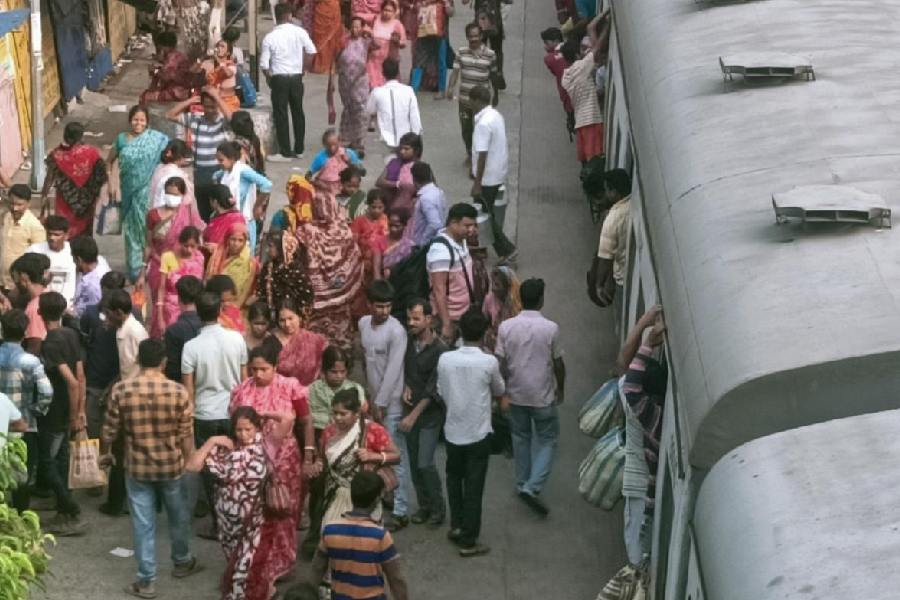Right outside south Calcutta’s Baghajatin railway station, there is a cluster of trees — banyan, gulmohar, mango. On sweltering afternoons they function as leafy waiting rooms for passengers of local trains that ply from Lakshmikantapur, Canning and Diamond Harbour. These dots on the map come under the Jaynagar and Diamond Harbour Lok Sabha constituencies.
Most of these passengers are women who do day jobs — domestic help, ayahs, vegetable vendors, daily wagers — in West Bengal’s capital city. They get off at Sonarpur, Garia, Baghajatin, Jadavpur, Dhakuria, Park Circus.
Aloka Das works in seven different homes in Santoshpur — sweeps, mops and washes up. Every house has more than one air conditioner. They have cars or bikes, large televisions and washing machines. “They have cooks, drivers, someone to look after the garden and also the pet,” she says. Aloka’s own house in Dhamua is a tin shed with bamboo fencing all around. She lives there with her husband who suffered a stroke some years ago and has been paralysed since. One son is a construction labourer in Chennai and another is yet to find employment. On her way back, Aloka buys vegetables from the seconds’ market on the platform and cooks once she gets home. “If I cook in the morning, the food will spoil. I don’t own a refrigerator,” she says. “Actually, no one in the immediate neighbourhood does,” she adds.
Bhagawati Devi comes from Gocharan. Her husband, too, is ailing. She works in a house in Selimpur for a doctor couple. Their children live abroad. “They give me so many saris in a year that I can put up a stall,” she laughs.
Kanika Pramanik goes back to Baruipur after working in six households and makes ₹12,000 a month. “In some of the houses their electricity bill is that much,” she says.
Sabita Hazra of Piali says, “They have pucca houses, air conditioners in all the bedrooms and the drawing room, chimneys in the kitchen. My tin-and-asbestos house is like an oven in summer. I cannot touch the walls.”
It is not possible that the Alokas, Bhagawatis, Kanikas, Sabitas are not aware of the stark difference between the world they inhabit and the world they work in. It is as if the hiatus is a given, an unchanging, unchallengeable reality. “We live in the interiors of Canning where there is hardly any pucca road. My mother still collects water from the tubewell in our para,” says Sonali Poilen, who works as a cleaner in a beauty parlour. Sonali is in her early twenties. Madhabi Dolui, who looks to be in her late fifties, has been coming to the city to work since she was 17. She says, “I used to work in eight-nine houses and earn ₹250 a month.”
The younger of these women have been to school, only to drop out after Class VII or VIII, but the older lot has received no education — they have learnt to sign their names and their names only, in a careful hand. Are they aware that the general elections are on?
Madhabi is, Sonali too, Bhagawati Devi, Sabita... But vote does not mean the same thing to everyone. Shibani Pramanik of Piali says, “I have to vote. I live in a panchayat area. Or else they will not help me when I need them.” For Kanika, it is a thing to be feared. She says, “We have to attend every meeting-michhil. The party workers threaten us. If you ask me, vote ele bhoy kore.”
Parul Mondol doesn’t know when Bidyadharpur goes to the polls, but she will cast her vote, that much she knows. She will vote to protest against inflation. Who will factor in her protest? She doesn’t know. What will come of it? She doesn’t know.
Usha Rani Devi, who is in her seventies, has been working in this city for 50 years. She is known as Bangal Bou in her locality. She explains why: “We came from Bangladesh. We had nothing. My husband and I worked day in and day out to build a house.” She has heard of the CAA (Citizenship Amendment Act) and has been told they might have to return lock, stock and barrel. She will vote. And will it be to combat this possibility or those who have raised this bogey? “No, no. No one will do anything for us. But if we won’t vote they won’t even let us live peacefully.”
Sonali says, “Vote is for rich people. They pay taxes, it is their money that the government uses to make roads and provide water lines. I don’t pay tax.” She adds, “I have a voter ID card, but I don’t vote. Party people come and collect my card the day before elections and return it later.”











